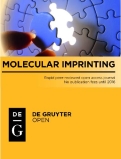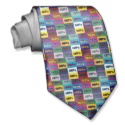|
|
Reference type: Journal
Authors: Hu CH, Chou TC
Article Title: Albumin molecularly imprinted polymer with high template affinity -- Prepared by systematic optimization in mixed organic/aqueous media.
Publication date: 2009
Journal: Microchemical Journal
Volume: 91
Issue: (1)
Page numbers: 53-58.
DOI: 10.1016/j.microc.2008.07.005
Alternative URL: http://www.sciencedirect.com/science/article/B6W6H-4T4XRJ0-1/2/ff803eaae69a712dc1d1dfea1c80a510
Abstract: An approach using systematic optimization for the formation of an albumin molecularly imprinted polymer (MIP), able to separate albumin from proteins in solution, has been prepared by imprinting albumin using a copolymer comprising 3-dimethylaminopropyl methacrylate and tetraethylene glycol dimethacrylate in a mole ratio of 1 to 8. Cytochrome c, lysozyme and myoglobin were used in competitive re-binding experiments to compete with the polymer's native template with all protein species present at 0.0004 g mL-1. The effects of: monomer to crosslinker mole ratio, polymerization temperature and time were investigated. It was found that the addition of water 6.04%, into the pre-polymerization albumin-monomer complex enhanced the adsorption capacity and selectivity of the resulting MIP from 2.18 x 10-3 to 6.02 x 10-3 g g-MIP-1 and 83.5% to 98.7%, respectively. These results also showed that the MIP possessed high selectivity and adsorption capacity with respect to albumin in comparison with interfering species also present in solution. Polymerization temperature, time and the water content of the pre-polymerization mixture were all shown to have significant effects on the resulting albumin-MIP's performance. However, their influence on the polymer's affinity for the potentially interfering species was negligible. Additionally, higher polymerization temperatures (> 38 °C) and extended polymerization times (> 60 h) increased monomer conversion as determined by HPLC, but decreased the selectivity and adsorption capacity of the MIP. An optimized MIP, with very high selectivity and 6.37 x 10-3 g g-MIP-1 template re-adsorption capacity was obtained using the following polymerization conditions: 0.125 mole ratio of monomer to crosslinker, 6.04 wt.% water content with respect to the mass of the monomer complex, 60 h polymerization time at 38 °C, and with 0.47% albumin in the pre-polymerization monomer complex. Finally, the functions of polymerization temperature, time and the significance of the water content in the albumin-monomer complex are also discussed
Template and target information: protein, albumin, bovine serum albumin, BSA
Author keywords: molecular imprinted polymer, albumin, Reaction conditions
|


 MIP Workshop WorldTour shirt
MIP Workshop WorldTour shirt







 multi MIPs logo mug
multi MIPs logo mug







 multi_mips_logo_tie
multi_mips_logo_tie






